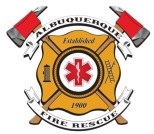
New Collaboration Will Train Every City Employee in Crucial Lifesaving Skills
AFR Lifesaver course announced by Mayor Keller and Dr. Barry Ramo teaches basic emergency management for bleeding control, CPR/AED for cardiac arrest, choking, and treating opioid overdose.
December 3, 2019
Mayor Tim Keller joined Albuquerque Fire and Rescue, Dr. Barry Ramo, and Project Heart Start today to announce a new collaboration that will train every City employee in a crucial set of core lifesaving skills by the end of 2020. The AFR Lifesaver course was developed in partnership with Dr. Ramo’s Project Heart Start, a hands only CPR and AED administration training module which has seen positive results in the community. The AFR course administered to City employees will take that training a few steps farther, including bleeding control and opioid overdose management, so that every City employee is equipped with the skills and the knowledge to respond when called upon to save a life.
“AFR’s mission is to protect our residents and respond to emergencies—and their community outreach and education has been a core part of their work,” said Mayor Keller. “At a time when the danger of mass shootings and the rate of opioid overdose is higher than ever, we want every City employee to be ready in a crisis. With AFR, Dr. Ramo, and Project Heart Start, we are giving every employee the power to be a lifesaver.”
AFR EMS Captain Stephanie Perea stated, “Residents on the scene of an emergency the moment it occurs are truly the first responders. Training them in a variety of life saving techniques creates that crucial step in the chain of survival of a patient with a life-threatening hemorrhage, cardiac arrest, or overdose.”
The class will teach skills necessary to save as many lives as possible in the event of an active shooter or other direct threat situation, administer hands only CPR, use an AED, and reverse the effects of an opioid overdose. Employees will receive hands-on training in dynamic scenarios with skilled paramedics and EMT's of Albuquerque Fire Rescue, learning the same life-saving techniques used by paramedics and military personnel.
Course Objectives:
- Empower participants to save the lives of the wounded;
- Obtain basic understanding of anatomy as it pertains to bleeding control;
- Be able to identify life threatening injuries;
- Understand and apply basic bleeding control measures;
- Understand and apply basic airway and breathing techniques;
- Be able to recognize and prevent hypothermia;
- Save their own life using their new knowledge;
- Understand and perform hands only CPR;
- Understand and use an AED; and,
- Be able to recognize an opioid overdose and administer the antidote
Uncontrolled bleeding is a major cause of preventable death. The average time to bleed out from a major artery is 2-5 minutes. Sudden cardiac arrest is a leading cause of death, effecting more than 420,000 people annually outside of the hospital in the US. 50% of these victims die before reaching the hospital. Lifesaver instructors will teach hands only CPR, AED administration, rescuing a choking victim, and recognizing the signs of a heart attack. Cardiac arrest survival rates dramatically increase with hands only CPR.
From 2013 to 2015, 374 people have died from opioid overdoses in Bernalillo County. 130 People die every day from opioid-related overdoses in the U.S. Nearly 2 out of 3 New Mexicans know someone who is addicted to opioids. Participants of Lifesaver learn how to recognize an opioid overdose and administer the antidote.

